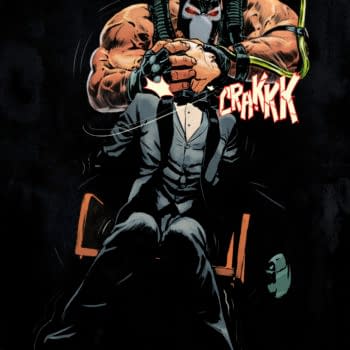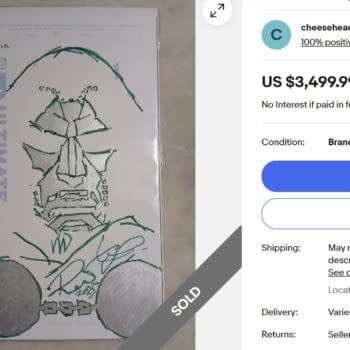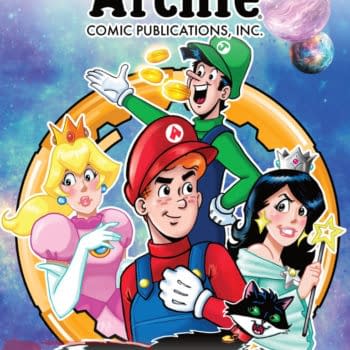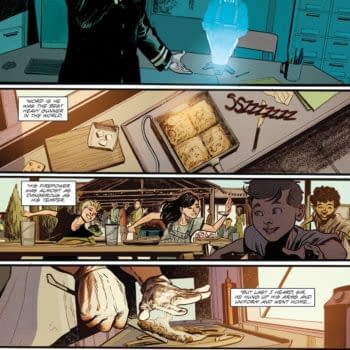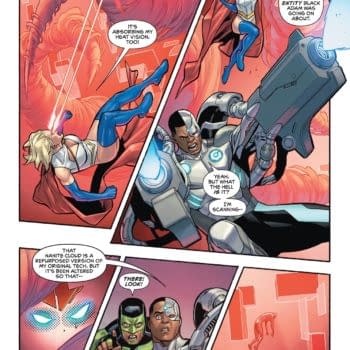Posted in: Comics | Tagged:
Sharon Moody – Could The Lawyers Get Involved?
This weekend I ran a piece by Scott Edelman about the work of Sharon Moody, who paints, amongst other things, reproductions of comic books in mid-read, the pages being flipped over. Scott was incensed on a moral level that the likes of Jack Kirby and Sal Buscema weren't credited or paid – and it felt like a similar argument I'd heard over the work of Roy Lichtenstein. On that argument I'd always been on the side of Lichtenstein, I thought his work transcended the original, although some note of the original work it drew from would have been nice.
Regarding Moody's work, it's not as clear cut, I'm not sure the recontextualisation works. But that's just one argument. Because Irene Vartanoff is Scott Edelman's wife. And used to work at DC Comics, including dealing with copyright and trademark infringement. And she has her own story to tell regarding Moody's work, which she agreed to share with Bleeding Cool.
When I was in charge of rights and permissions at DC Comics, in the 1980s, we tracked down any infringements we became aware of, and told the infringers in no uncertain terms (often as a letter directly from our lawyers) to cease and desist. This meant telling people to stop using the distinctive (and trademarked) Superman symbol. This meant telling people to stop using the distinctive (and trademarked) Superman telescopic logo lettering. Of course it meant telling them to stop using his image.
The guy who put Superman on his wedding invitations thought we were poor sports, and did not understand that he was violating copyright and trademark by swiping a specific Superman image and republishing it himself (or paying a catalog company to do it for him). He was infringing on DC Comics' right to exploit the Superman image in wedding invitations. This might seem trivial, but it's not. When Hallmark recently obtained a license to market Green Lantern greeting cards priced at $7.99 each, it surely paid for the exclusive right to do so, not to have competition from anybody with access to a copier and some card stock. Licensing of comics characters has had a long and lucrative history. DC Comics naturally had to protect its right to control its copyrighted and trademarked images.
The guy who spent thousands to have Superman painted on his tour bus was even more upset that DC Comics was unwilling to let someone else make money off the Superman character. He didn't realize that the painter was ripping DC Comics off. He probably didn't care, either, but my duty was to inform him (and our law department) that an infringement had occurred.
The recent case Scott Edelman cited [ed. note: he's my husband] of artist Sharon Moody creating works of art by copying entire comic books spread open and creating a trompe l'oeil effect on an otherwise blank canvas has several infringement implications. I'm not a lawyer, but I was trained by one at DC Comics, and here's what I see as the potential legal problems inherent in her utterly faithful copies of the original publications:
1. The commercial use of a significant amount of any publication, rather than a panel excerpt or up to about fifty words of text, is not fair use. It requires permission by the copyright holder, and such permission usually carries a fee based on the profit involved in the re-use. If one of Sharon Moody's paintings of a Batman comic page sells for $50,000, she would be expected to pay DC Comics a very hefty chunk of that sale price. Such a deal would have to be negotiated before she copied and sold the material; otherwise, the rights owner could sue her to obtain all her proceeds.
2. The reproduction of any published printed copyrighted material requires a copyright notice. Although there are many instances on the Internet of people grabbing a panel here or there, or a figure, to illustrate a website article or a blog post, or even entire pages to amuse friends on Facebook, these are properly accompanied by a copyright notice. They only escape a cease and desist letter because they are not commercial use and/or they are too small and random to come to the attention of and infringe on the rights owners' commercial rights. Sharon Moody's artwork is on display for sale to the public in an uptown Manhattan gallery, which makes it commercial, and potentially neither small nor random, depending on the prices realized for each of her copied canvases.
3. Sharon Moody's exact copies of published comic books can be construed both as plagiarism and as muddying a trademark. (There's a technical legal term for the latter and I've forgotten it. Sorry.) In a court case, the comic book companies could make a compelling argument that she is aware the general public will mistake the pages she has copied for her own original work rather than copies of previously existing work. Their argument would be that she is passing off someone else's work as her own. The evidence would be that she does not credit any of the original creators of the physical artwork or the words, or the copyright holders.
Most infringements are "mistakes," that is, they are perpetrated by ignorant people who do not know anything about copyrights or trademarks. Characters such as Superman or Batman have been popular for so long they have entered the zeitgeist and therefore many people imagine they in some way belong to all of us. Perhaps they do, morally or culturally. However, both the copyrights and the trademarks of comic book characters have been the subjects of extended lawsuits for decades now. It would be hard to claim ignorance of their vast commercial value. Anyone trying to cash in on such commercial value without license runs the risk of being sued.
There's another side to infringement enforcement, and that is what might be called plausible denial. When I did rights and permissions for DC Comics, we routinely looked for potential infringements, but we knew we probably missed some. As long as we could show a court that we vigorously defended the copyrights and trademarks every time we found an infringement, we could keep our legal right to them. Ignoring blatant commercial infringements is the road to losing those rights, which is a commercial catastrophe. Sharon Moody can call this art, but especially if big money is involved, it's commerce.
Some comic book artists have helped support themselves in their old age by re-drawing comic book pages they were hired to originally create as works for hire for the companies in years past. Usually, the companies look the other way instead of pursuing these elderly artists for this kind of commercial use, presumably because it doesn't involve enough money to be worth the lawsuits, and it would result in bad press. In fact, Disney did pursue the artist Carl Barks for making such copies, but backed away from the bad publicity the move generated. Bob Kane, known for his involvement in the creation of Batman, also used to sell paintings of Batman, without being sued. Thus Sharon Moody's lawyers would have a potential rebuttal, that an artistic, single use has a pattern of being tolerated by the rights owners.
So, is Sharon Moody an infringer? By the standards I was taught while employed at DC Comics, yes, but it's for a court of law to decide. The comic book companies may choose to ignore her. I don't think any company bothered to sue Roy Lichtenstein for his many blatant copies of individual comic book panels in the early 1960s. Then again, he didn't swipe entire pages, use photographic accuracy, or copy famous superhero character images and their trademarks. He wasn't in any way threatening their licensing value. There wasn't a Captain America movie then, or a Batman movie franchise. Less was at stake.










